- What is the mangosteen and where it grows?
- How is the mangosteen useful?
- Contraindications for use
- How to choose, eat, store the mangosteen
- How to use the mangosteen
According to one legend, once upon a time the Buddha found the mangosteen and, impressed by his amazing taste, gave to people, calling a wonderful gift of the sky, Fruit of the Gods. This exotic fruit looks like a familiar fruit and, at the same time, looks like nothing! However, while its taste and aroma like almost everyone who dared to try. In addition to a pleasant taste, mangosteen has a high content of vitamins and vitamins useful to the body. For these properties in his homeland, the mangosteen is called the king of fruit.
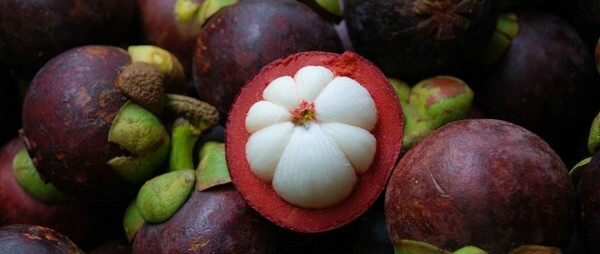
What is the mangosteen and where it grows
Mangosteen is an unfamiliar and rather exotic fruit for our country, so first of all you need to understand what it is and where it grows.
Mangosteen, or mangosteen, is the fruit of evergreen, high( up to 25 m) tree from the family of Clusiev, Garcinia. The tree is distinguished by a beautiful pink color of young leaves, which with age become dark green on top and light green on the underside. Flowers also look unusual - their fleshy petals are covered with bright red or green spots.
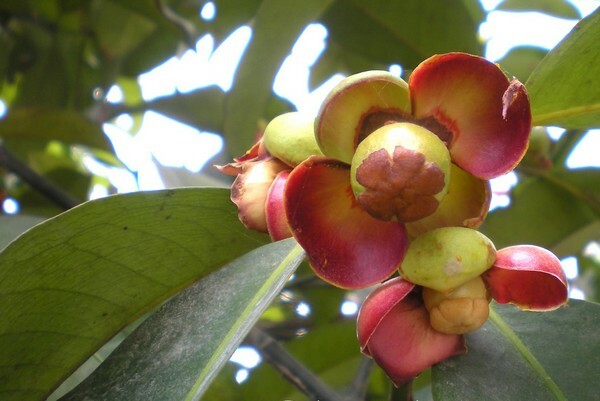
After flowering, small round fruits are knotted, covered with a dense thick skin of purple or maroon color. Under the inedible peel hides a white flesh, divided into segments, like a mandarin. As a rule, such lobules can be from 4 to 8 pieces in one fruit. To describe the taste of this fruit is almost impossible, since it does not resemble anything and for everyone sounds in its own way. How the fruits of the mangosteen look can be seen on the photo:
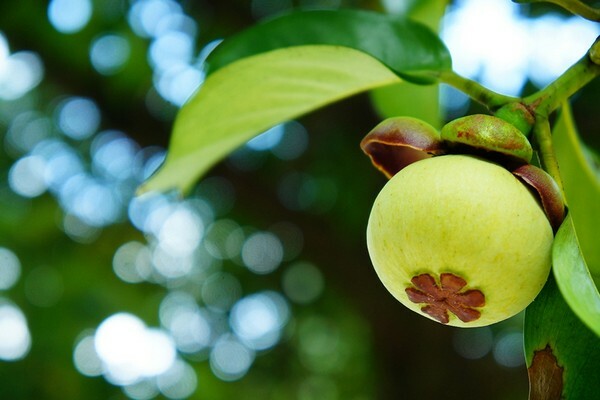
The homeland of the mangosteen is the tropical regions. It was first discovered in the Malay Archipelago, also found in Thailand and some other countries of eastern Asia. Despite the fact that some countries grow mangosteen in their botanical gardens, this is a very demanding tree. It needs a wet equatorial climate, without droughts and winds. Even a short-term drop in temperature to +5 degrees will be fatal for him.
Than the mangosteen
is useful. The fruits of the mangosteen tree are small round fruits that have a wide range of useful properties. Thanks to them, mangosteen is called the Fruit of the Gods - for great health benefits and the ability to heal many diseases. Its useful properties were known as early as the beginning of the 18th century, and with the development of science and medicine they also received a scientific justification.
These exotic fruits can strengthen immunity, accelerate the healing of wounds, relieve inflammation caused by sciatica, arthritis and other similar diseases. Its use helps in the fight against allergies, skin diseases, including eczema, and also, destroys microbes, viruses, fungal infections, parasites. There is an opinion that the mangosteen also contains certain components that can help in the fight against cancer.
The mangosteen contains the most vitamins, microelements necessary for the human body, in particular:
- vitamin C;
- vitamin E;
- thiamine;
- nitrogen;
- sodium;
- riboflavin;
- potassium;
- zinc;
- magnesium;
- calcium;
- phytonutrients, biologically active chemicals.
Interesting! The composition of mangosteen is nicotinic acid, so its use helps to cope with nicotine or alcohol dependence.
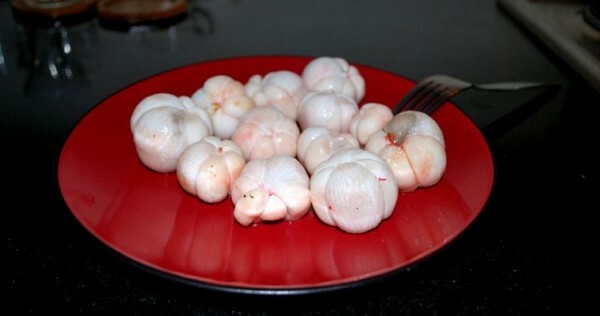
. The main cause of the active health-improving effect of mangosteen on the body lies in its composition. It contains many unique components that can significantly improve the general condition of the body and cope with the causes of many diseases.
The fruits of mangosteen are rich in xanthones, about 60 varieties of this antioxidant have been found, even medicinal aloe contains them several times less. Due to their antimicrobial action they are able to slow down the multiplication of bacteria, fungi or viruses. Due to the significant content of fruit antioxidants, among them xanthones, catechins, proanthocyanidins, polyphenols and sterols, mangosteen effectively protects cells from the effects of free radicals.
Especially useful are the fruits of mangosteen if necessary to prevent and treat the following diseases:
- cataract;
- hypertension;
- arthritis;
- osteoporosis;
- oncological diseases;
- kidney stones;
- atherosclerosis.
The beneficial properties of mangosteen fruits can also be attributed to the ability:
- to normalize sleep;
- to improve appetite;
- normalize digestion and metabolism;
- cleanse the body of accumulated toxins and harmful substances, rejuvenate it;
- eliminate headaches, including migraines;
- to tone the body;
- normalize the hormonal background, the functioning of the endocrine system;
- eliminate dermatitis, allergic reactions.
Thanks to the substances in its composition, mangosteen has the ability to restore liver cells, improve blood composition, normalize the work of the gastrointestinal tract. The intake of mangosteen after meals is able to control the level of sugar and fats, thus contributing to weight management, so it is often used for weight loss.
Also to the list of diseases, which are helped by mangosteen, can be classified as Alzheimer's, Parkinson's, gum disease, glaucoma, melanoma and even leukemia.
In addition to medical use, these fruits are actively used in cosmetology. The extract of mangosteen is added to soaps, creams, masks for the skin. It helps to cope with acne, inflammation, rashes on the skin, eczema.
Contraindications to use
In mangosteen there are no special contraindications. However, there are some recommendations, restrictions to use. Since mangosteen is a rather exotic fruit, it can cause allergic reactions or individual intolerance in people who are not used to it since childhood.
Also, according to recent studies, xanthones contained in the mangosteen, improve blood clotting. Therefore, eating these fruits is not recommended for people taking drugs to dilute it.
As the scientific study of the properties of xanthones is still ongoing and all their properties are not completely known, use mangosteen during pregnancy, breastfeeding, and also small children should be cautious, best of all - after consulting a specialist.
How to choose, is, store the mangosteen
Since mangosteen is a rather unusual fruit for our latitudes, sometimes when buying it in stores it can be difficult to make the right choice, especially if this is the first acquaintance. To avoid disappointment and frustration, you need to remember a few simple rules:
- a ripe fruit should be tight, but slightly spring when pressed. Too hard mangosteen will be unripe, and soft - spoiled;
- it is not necessary to choose very small fruits, because of a thick skin in such mangosteen there will be very little edible pulp;
- a fully ripened fruit is characterized by intensive skin coloring;
- overripe fruit can be distinguished by dry, cracked peel;
- it is better to choose fruits delivered from China, Thailand or other countries of southeast Asia.
Before the first test, it is advisable to learn how to properly clean the mangosteen, otherwise it can become a real problem. In fact, it is quite easy to clean this fruit. To do this, the stem is torn off at the beginning, then the skin is cut in a circle, trying not to touch the flesh of the fetus. The incision should be quite deep, since the thickness of the skin is 7-10 mm. In addition, you can make cuts from the bottom and sides. After that, the peel is easily removed, exposing the snow-white fragrant flesh. You can also get it with a spoon. There is a flesh to be gently, since in the lobules there are quite large bones.
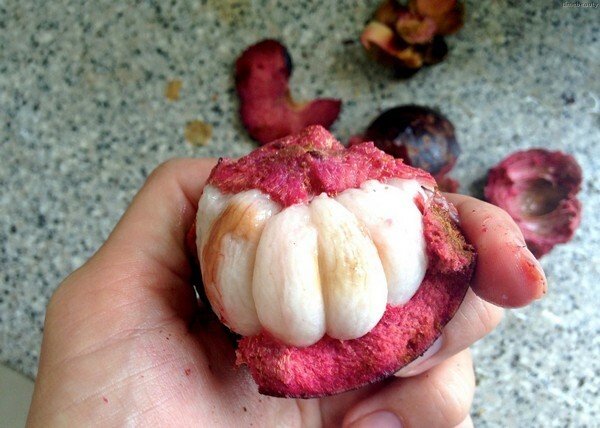
One of the remarkable properties of the mangosteen is its shelf-life. In a closed dry place( but not in a cold place) they can be stored for about 20-25 days. At the end of this period, the skin hardens, becomes harder, the flesh dries up and loses its taste. In the refrigerator mangosteen is stored for 1-2 weeks, the longer it will lie, the more over-mature will become the flesh.
How to use the mangosteen
First of all, mangosteen is used as a dessert in its raw form. They can be found in the menu of almost any restaurant in Thailand. Also, fruits can be frozen or canned, although they may lose their characteristic aroma and taste if processed incorrectly. In Malaysia, it is customary to cook jam or jam from a mangosteen.
Sour-sweet jam from mangosteen
For preparation it is required:
- approximately 200 g of pulp;
- 70 g of sugar;
- as much water;
- 2 tbsp.lime juice;
- 1 tbsp.l.pectin for thickening.
In the beginning, syrup is made from sugar and water, add the pulp of mangosteen to it and cook everything together until softening. After that, in the jam, add lime juice, pectin, and cook over low heat until thick. Ready jam is laid out in sealed jars.
Cream-mangosteen cocktail
From mangosteen you can cook a delicious, and most importantly, a useful cocktail:
- 250 g of pulp puree;
- 100 g of cream;
- glass of water.
All ingredients are mixed in a blender, adding a little sugar to taste.
Mangosteen juice is also very useful, it preserves all the useful properties of fresh fruit. In stores, he appeared recently, but is already very popular. The use of mangosteen juice maintains a high level of pH in the body, thereby helping to get rid of various harmful bacteria and parasites that need an acidic environment for normal functioning.
Recent studies show that the mangosteen promotes the breakdown of fats, the same properties are possessed by the juice made from this fruit. Regular intake of mangosteen juice helps to lose weight, maintains good health. It helps to recover from operations or serious illnesses.
Important! The main benefit of mangosteen is not concentrated in the delicious pulp, but in a thick peel. It contains the majority of xanthones. Therefore, for therapeutic purposes, it is recommended to prepare a pulp from the pulp and peel.
Mangosteen is an exotic fruit with an amazing taste and a wide range of useful properties. Due to its rich composition, this fruit contributes to the overall strengthening of the body, recovery from disease. Regular use of mangosteen will strengthen immunity, regulate metabolism and will please with surprising, on what unlike taste and aroma.
